Final report for ONC23-127
Project Information
Local bee clubs can never accommodate all the topics its members want, especially the ones that require time- and resource-intensive topics such as queen rearing, splits, and cut outs and swarms. Monthly meetings are constrained with time of day, length of meeting, indoor settings and attendance by mixed levels of prior connections and experience. By producing Learning Circle field days and monthly maintenance calls, Iowa beekeepers will get the learning they want and the partners will get to efficiently teach their special skills without the worry of administrative tasks that organizing a field day requires.
Field day topics were chosen to increase the sustainability of beekeeping: splits prevent lost swarms while continuing genetic preferences, queen rearing combats the high cost of time-sensitive requeening while also continuing genetic preferences or introducing diversity, cut outs and swarms fight chemical bee removals and improve community safety while increasing genetic diversity. Field days and Zoom calls will increase social sustainability, too.
Lastly, learning circles can include the many learners who do not have club memberships.
The learning circle model will span one year with 12 monthly Zoom meetings, three in-person field days, a culminating event, and storytelling to promote the learning circle model in the future and cement the experience for participants. This project is for beekeepers interested in learning about topics that require more time than a monthly club meeting, but not so much time that a person couldn’t travel there and back in a day.
Cooperators
- (Educator)
- (Educator)
- (Educator)
- (Educator)
- (Educator)
- (Educator)
- (Educator)
- (Educator)
- (Educator)
- (Educator)
- (Educator)
- (Educator)
- (Educator)
- (Educator)
- (Educator)
- (Educator)
- (Educator)
- (Educator)
- (Educator)
Research
The learning circle method was delivered in two forms: online and in-person. Both methods required registration.
In the end, the topics were determined using the following criteria:
- Requires more time than a monthly club meeting can give
- Mentioned in the last ten years of bee club member input
- Would not take so much time that a person couldn’t travel to the circle and back in a day
Registration for both types of learning circles were done digitally. This took two main forms: a QR code displayed on-site at in-person learning circles and as a hyperlink everywhere else – promoted on Facebook, LinkedIn and Instagram with my personal accounts as well as my own monthly email newsletter to area beekeepers (about 350 people). Both forms took users to a landing page. The landing page gave an event description and contained an additional hyperlink for registration.
Out of respect for the in-person presenters' heavy investment of time and resources, registrations for in-person learning circles required a $20 deposit that would be returned upon participation as a way to ensure attendance. The amount of $20 was chosen to be significant enough to encourage someone to honor their registration yet insignificant enough to give up should someone need to cancel. I also accepted checks for the very few beekeepers who did not use PayPal.
Seven online (total of 9 offered) and 6 in-person learning circles were delivered as shown in the table below. Because a significant amount of money was unused in 2023, mostly due to the price of space rentals for in-person events, a no cost extension was granted in March 2024. This money was used to offer 6 more online learning circles and 4 more in-person learning circles in 2024. See Table 1.
|
Topic |
Delivery method |
|
First hive inspections |
Online |
|
Splits |
In person |
|
Spring hive inspections |
Online |
|
Legal considerations for businesses |
Online |
|
Grafting |
In person |
|
Cutouts |
In person |
|
Queening |
Online |
|
Extraction |
In person |
|
Nontraditional hives |
Online |
|
Late hive inspections |
Online |
|
Swarms and cutouts |
Online |
|
Feedback session (was culminating) |
In person |
|
Accountability and leadership |
Online |
|
Feedback |
Online |
|
Marketing |
In person |
|
Ways to use a nuc |
Online |
|
Make your own nuc |
In person |
|
Swarms |
Online |
|
Cutouts |
In person |
|
On The Spot queen rearing and splits |
Online |
|
Grafting |
In person |
|
Internet for research |
Online |
|
Logo creation and critique |
Online |
|
Bottling and other considerations |
In person |
|
Insurance |
Online |
Table 1. Learning circle topics and delivery methods.
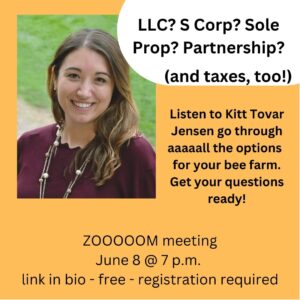
The online learning circles were offered monthly in 2023. In-person learning circles were scheduled according to the availability of the presenter, related resources, and seasonal appropriateness. With no registrants or attendees at the Dec. 2023 and Jan. 2024 online learning circles, I stopped offering online sessions for Feb. - April as originally proposed. The topics of Dec. and Jan. were spent getting participant feedback, determining future steps.
Three deviations from the project proposal occurred. First, the Extraction Learning Circle with Mike was something I had planned for this project but couldn’t get a commitment before submitting. He ended up committing a month and a half before the event, which I promoted the same as the other learning circles and took a $20 non-refundable fee from everyone. The fee was used as rent for the space since it was not included in the grant budget. Because no grant funds were used for Mike, he and the participants were not surveyed.
The second deviation was the Culminating event in November. My Partner Beth was injured and unable to make the event and it was close enough to the date of the learning circle that I was unable to cancel the food and room reservation. Therefore, I treated that time as an open house to get feedback from attendees about past and future learning circles.
I rescheduled with Beth for Feb. 2024, and decided to assemble a marketing panel around her storytelling for the last in-person learning circle. This learning circle incorporated storytelling at one station (with the Partner), tasting at another station, DIY branding at a third station, and selling at markets as a fourth station.
The third deviation was the lack of an administrative assistant. The Iowa Farmers Union thought I could use their staff, and it did not work out. I took on those duties as needed.
Learning circles were seen as a likely way to improve beekeeper lives by increasing
- sustainability of beekeeping operations
- social connections
- sustainability of financial operation
I have included the Culminating event in the category for in-person field days (for a total of 4 in-person field days) to show delivered results against the objective, with the marketing panel from Feb. 2024 showing in the category of Actual 2023 (before the no-cost extension was approved) in Table 2. I planned on holding 4 learning circles in person and 12 online; I ended up holding 10 in person and 13 online.
| Type of event | Proposed number of events | Actual number held in 2023 - Feb 2024 | Actual number held Mar - Aug 2024 |
| In-person learning circle | 4 | 6 | 4 |
| Online learning circle | 12 | 7 | 6 |
| Totals | 16 | 13 | 10 |
Table 2. Number of learning circles proposed against number held.
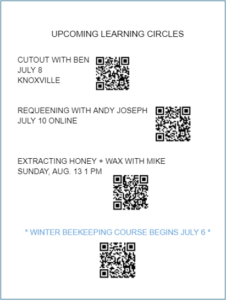
Registration by QR code (see image for example) and hyperlinked text was successful. There were no requests for paper registration forms through the mail. Overall, time was not spent on optimizing social media platforms and conversion rates of getting someone from a promotion to a registration. A significant number of registrations came from people I did not personally know and from people residing outside of a one hour radius from the in-person sites. A few participants attended the online learning circles from out of state and let me know that they attended because of my Instagram account.
Learning circles were delivered online and in person with attendance as shown in Table 3.
| Type of learning circle | Registrants 2023 | Attended 2023 | % attended | Registrants 2024 | Attended 2024 | % attended |
| Online | 166 | 64 | 39% | 77 | 44 | 57% |
| In-person | 82 | 71 | 87% | 29 | 27 | 93% |
| Total | 248 | 135 | 54% | 106 | 71 | 67% |
Table 3. Attendance rate of two kinds of learning circles
A total of 153 unique participants were counted, showing that people signed up for multiple events. The audio recordings taken during the Feb. 2024 event show that awareness of prior events was very low among some participants and they liked the format enough to wish they had attended past learning circles.
One goal of the project was to reach “lone ranger” beekeepers who did belong to any bee club. From surveys received for programming held March - July 2024, 41% of those surveyed belonged to a bee club and 59% were lone rangers (not in a bee club). This statistic verifies the premise that learning circles can include many learners in the lone ranger segment of the beekeeping community. It also shows that club members are interested in learning topics that require more time than a monthly club meeting can give.
Without people attending Dec and Jan offerings, I used those scheduled times to compare them against the zoom calls with guest speakers and concluded that participants prefer that “someone” (me) choose topics that are presented by guest speakers.
This conclusion matched what I found with a Farmer-Rancher grant (FNC21-1289) that I held in 2021-22. One objective of the grant was to distribute planners for beekeepers to complete themselves. What I learned was that the majority of beekeepers wanted “someone” (me) to record dates and species rather than learn to identify species and track them on their own.
I also considered that Dec. and Jan.’s learning circles were promoted by email and social media only – no preceding in-person learning circle. Additionally, I widened my view of the community landscape and noticed that very few bee club meetings occur in this time period, so perhaps community preferences are to have no gatherings between the state honey producers convention and the end of beginner beekeeping classes.
Hands-on learning circles had high attendance, 87% in 2023 and 93% in 2024, telling me that the topics and format were appropriate. Requiring deposits of $20 for in-person learning circles seemed like an acceptable amount for not showing up. I received no complaints about the fee, only regrets when someone couldn’t attend.
People drove over an hour for the right topic! One criteria for choosing learning circle topics was that the topic would not take so much time that a person couldn’t travel to the circle and back in a day. See the red pins on the map below.
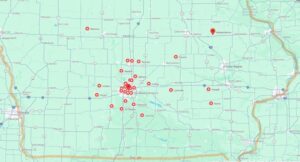 Map. Locations of in-person participants on map
Map. Locations of in-person participants on map
Surveys were administered according to the learning circle delivery. Online learning circle participants were automatically taken to an online survey when they left the zoom meeting. In-person learning circle participants were given a paper survey or a QR code to scan and take with their mobile device. Not all participants turned in a survey and some surveys were returned incomplete. Responses to all surveys are presented below. No surveys were given to participants in the extraction learning circle as noted above in the Method section. Both 2023 and 2024 survey results are shown in Table. 4.
| Question | Percent of all surveyed |
|
This presentation increased your knowledge about the topic |
74% |
|
This presentation changed your attitude about the topic for the better |
69% |
|
This presentation changed your awareness or skills about the topic for the better |
59% |
|
This presentation will increase your economic benefits (leading to a more sustainable business or increased sales) |
50% |
|
This presentation will improve the environmental benefits of your apiary, such as increasing soil, water, or air quality |
35% |
|
this presentation will change your social benefits, such as gaining larger support network and potentially helpful connection |
71% |
Table 4. Participant survey results
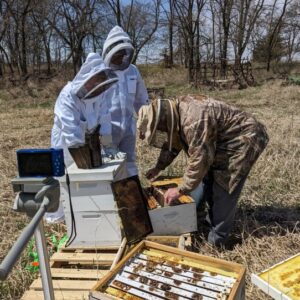
The Marketing In-Person Learning Circle that was held in Feb. 2024 and Branding Logos Virtual Learning Circle had a slight twist - Brandon and I decided to offer participants a one on one, 30 minute logo consultation at a $30, two to one grant to participant cost-share ($20 grant fund and $10 participant) between the date of the learning circle and Nov. 11, 2024. Only one person took up the cost-share offer.
I had Partners present at in-person learning circles in 2023 and Feb. 2024. These presentations used considerable resources above and beyond that of the speakers I hosted for online learning circles. Partners Randall Cass, Tyler Lane, and Ben Hoksch and the three presenters from the Marketing Learning Circle including Partner Beth Hoffman and in-person presenters Sara Todd Holton and Brandon Glenn were surveyed in February 2024. All March - July 2024 partners were surveyed in August 2024, including Tyler and Ben, who presented the same topic twice, once in 2023 and again in 2024.
|
Question |
Percent of all surveyed with “yes” answers |
|
Did your learning circle help you establish new connections with beekeepers? |
100% |
|
Did your learning circle help you establish a new or increased role with beekeepers? |
86% |
|
Did your learning circle result in new collaborations for new or increased education activity for your work? |
64% |
Table 5. Partner survey results
Discussion
Participants want a “one and done” learning circle. To illustrate this point, consider that only one person took the logo consultation offer with Brandon.
A small circle of peers (less than 15 people) was successful in increasing engaged participation as evidenced by the recordings taken during the storytelling component of the Marketing Learning Circle and from the comments. Here is a transcription from one participant’s audio (also available to listen with >this link to .wav file<). He attended multiple online and in-person learning circles and is seen in the photo below (wearing a red bandanna) from the in-person learning circle on Cutouts:
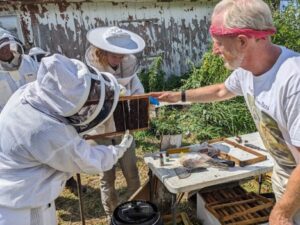
"…it’s not lecture. Yeah, I sit back in a lecture, in a big group. And of course, for lectures or like our conferences, they’re a lot bigger groups.
It can be a little intimidating sometimes to ask the questions you want to, because maybe everybody else in the room knows this. And maybe I'll pick it up somewhere else. And I don't ask.
And I've never had, in any of the groups with any of the beekeepers, anybody go, “Oh, wow. Everybody knows that.” Everyone's always very gentle. Beekeepers are a great group. But for the learning circles, like today, we've just got, you know, 15 people maybe, and it's all very intimate and you can ask anything and everybody's very comfortable with each other in that smaller group. I don't know if it's a thing with beekeepers that we might be a little more introverted, but we sure seem to be more comfortable in smaller groups and just one on one with folks or alone with our bees."
Educational & Outreach Activities
Participation summary:
Iowa Specialty Crop Producers Convention, Jan. 8, 2024, Ankeny, IA (see NC-SARE’s YouTube channel: https://youtu.be/4P7tfoVoKJw?si=mwZtRJhz4TCsPSZK)
Southwest Iowa Beekeepers Club, Mar 2024
Iowa Farmers Union board meeting, forthcoming
Learning Outcomes
grafting
cutouts and swarms, swarm control and nucs
queening and queen rearing
extraction
nontraditional hives
first, spring, and last of the season hive inspections
splits
marketing and DIY logos
legal considerations, insurance
business structures and taxes
seasonal hive inspections, veiling up and working in tune with bees for success as opposed to suiting fully and racing against the clock
internet research to find academic studies on best practices without paywalls
bottling and related considerations
Project Outcomes
The project had outcomes that address two of SARE's goals, economic and social sustainability.
With respect to economic sustainability: Tyler, Ben, Brandon, Beth, Sara - four of these people began offering the same workshops on their own or repeated it with me after this project; three of them were presenting past or passion work with this project and reported a “reactivation” from the project.
With respect to social sustainability: Most participants gave me spoken word comments about wanting more time to visit among themselves at some point during our in-person time. Not that they didn’t appreciate the scheduled programming, but they felt very comfortable and freer to talk in a small group as opposed to large groups.
There are two sides to the remaining Project Outcomes - the participant side (with two kinds of outcomes, learning outcomes and project outcomes) and the partner/presenter side.
Learning Outcomes for Participants. In the survey results from both 2023 and 2024 shown in Table 6, we see that a majority of participants believed learning circles helped them. The responses show that they were unclear about applying the information from the circles to change the environmental benefits of their apiaries, such as increasing soil, water, or air quality.
|
Question |
Yes |
No |
Unsure |
|
Participant: Increase knowledge or skills for sustainable operation |
88% |
12% |
0% |
|
Participant: Changed attitude about the topic |
79% |
18% |
3% |
|
Participant: Changed awareness about the topic |
85% |
9% |
6% |
|
Participant: Change your economic benefits for the better |
76% |
18% |
6% |
|
Participant: increase environmental benefits |
51% |
47% |
2% |
|
Participant: Change social benefits (< 100% due to incomplete surveys) |
87% |
7% |
3% |
Table 6. Participant survey results
Project Outcomes for Participants. Outcomes included learning circles as a new and successful way to learn. From the comments and audio recordings, we see an overwhelmingly positive benefit that includes more encouragement and comfort in asking questions of and having access to the presenter or partner. Accessibility and community building seem to have made big impressions. There was also feedback about wishing they knew about learning circles earlier.
Another outcome was reaching lone rangers. Learning circles were promoted in a way to include lone rangers, which was a goal I achieved (59% of 2024’s participants were self-reported lone rangers). However, I was surprised that the 41% of beekeepers who reported belonging to organized clubs were giving the name of those clubs as something else. For example, one person said they belonged to the “Iowa Beekeepers Association.” I do not know of a group with this name. Perhaps they meant “Iowa Honey Producers Association” or they could have been thinking about a Facebook group called “Iowa Beekeepers,” which does not have a traditional organization with in-person meetings. Therefore, I conclude that the project reached lone rangers and club members alike, but the ratio is unclear.
Lastly, I found it interesting that I was unable to get feedback from the leadership of multiple organizations. I personally invited them to several virtual learning circles in 2023 and not one of them registered.
Project Outcomes of Partners and Presenters. I surveyed all 24 partners and presenters from 2023 and 2024; results of those responding are shown in Table 7. Learning circles appeared to make a positive difference for partners and presenters. Three of them gave feedback about pursuing future work using the same small group, hands-on format of a learning circle.
|
Question |
Yes |
No |
Unsure |
|
Partner: establish new connections or new/increased roles with beekeepers that result in sharing knowledge to positively impact hobby operations |
100% |
0% |
0% |
Partner: establish a new or increased role with beekeepers |
88% |
12% |
0% |
|
Partners: number of new collaborations that resulted from respective field day for new or increased education activity into their work |
65% |
35% |
0% |
Table 7. Project outcomes of partners and presenters
Comments were extremely positive as shown in the sampling below. Only two negative comments came in and they were about the timing or scheduling, not the topic of the learning circle or the presenter.
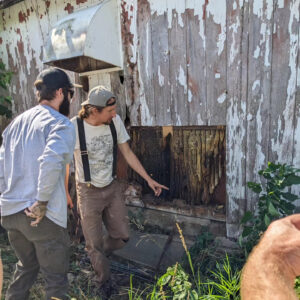
Partner Comments:
- Thanks for the opportunity to put this together! I hope to spend some time developing these into separate and more in depth talks that I might offer to bee clubs for a fee. Maybe take it on the road!
- Loved participating and connecting with other beekeepers
- I had a nice time with the Learning Circle group and I would be happy to collaborate again.
- I found the work interesting and engaging.
- I would like to go further in depth [on my topic].
- I enjoyed helping out with new beeks and conveying my experience with my home made diy nucleus boxes! Would be willing to do it again next year too.
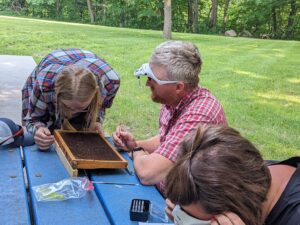
Participant Survey Comments
- This was time well spent.
- I think this program is amazing and valuable! I appreciated this learning circle very much and excited to participate in more in the future
- The video with a speaker talking us through the video really works. (n.b. I modeled this learning circle after an Iowa Learning Farms webinar in which the presenter narrated a pre-recorded video to a live audience.)
- I just wish that I had had this experience when I first started beekeeping and finding no support for assessing my hives. Beekeeping is one of those life-long learning experiences.
- Thank you, this was great to try it. I wanted to focus and learn grafting this year. I tried once but failed because I didn't manipulate the hive appropriately. This class was great and I'm excited to go home and give it a proper go. Thank you so much for sharing your expertise!
- Oh my gosh! This was such a great learning experience. A huge thank you to the grant people for offering the grant, and to Julia and Taylor [sic] for their hard work of putting all of this together. Thank you !!!
- Great class. Makes grafting much more approachable.
- [G]reat learning circle. walked away with alot more confidence in my cutout abilities
- Ben was a Fantastic Presenter on the Procedure of doing a Cut Out. I Learned Soo much and got a much better Idea of what is involved in the Process. I Feel much more prepared and appreciate the Hands-on experience!
- I hope to be able to do a cutout or 2 next Summer and I really appreciate all the Tips and Tricks Ben has Shared. I feel like maybe I'll be able to start with a leg up!
- I appreciate the quality level of expertise available, friendly and inviting - not intimidating
- I enjoyed today! Very informative! Thank you!
- I've met so many good people from the classes.
- Love learning circles! My favorite method and most useful education that I've used and attended! Confident and can't wait to give it a go! Has helped me tremendously.
- Val did an amazing job. She very generously shared all that she had learned through research and experience so that we can benefit with far fewer missteps. Excellent presentation- one of my favorites.
- Being able to speak to an expert in marketing/advertising/promotions was useful. Many of the concepts Brandon brought up seemed fundamental in concept, but I know the art is in using the fundamentals to produce something greater than the sum of its parts.
- Absolutely love this! I seriously learned a lot that will help me expand my operations and my profits in the end. I’ve learned way more with the Learning Circle than I have any other classes or seminars that I’ve attended.